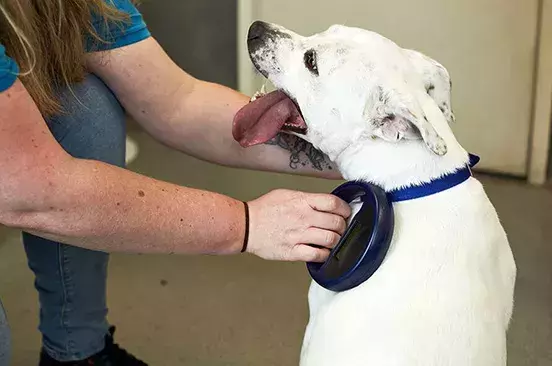A new report on pet microchipping shows a troubling decline in effective microchipping of both cats and dogs.

In 2022, only two per cent of stray cats brought to Battersea were able to be reunited with their owners through a microchip, and three out of five cats (59 per cent) brought to our centres were not microchipped at all, highlighting major problems in effective feline microchipping. Whether or not an animal has a microchip with up-to-date details has a direct impact on the ability to reunite pets with their owners.
Unfortunately, this was the reality for one-year-old cat, Kina. Kina was found in good health but roaming in a park alone by a passerby and brought to our London centre. From her very friendly nature and beautiful, shiny coat, staff strongly suspected she had been someone’s pet, but as she was found with no microchip, staff were unable to trace where she had come from. Sadly, no previous owners were found, but the rehoming staff were soon able to find Kina a new loving home.
From 10 June 2024, a new law will require all cat owners in England to have their cats microchipped. Cat owners found not to have microchipped their cat by this date will have 21 days to have one implanted or may face a fine of up to £500.
Rachel Saunders, Cattery Manager, said: "When a microchipped cat is brought to us as a stray, we can usually orchestrate a joyful reunion, sparing heartache for owners, but for most stray cats we take in, there is no chip at all, leaving us unable to trace where they may have come from.”
We also highlight that the failure to keep their contact details updated on microchipping databases leaves staff unable to notify the owners when a pet is brought into their care.
Rachel added: “With greater responsibility from cat and dog owners to update microchip information, we can reunite many more pets and spare countless families from needless suffering.”
While cat microchipping rates are troublingly low, dogs are also being failed by inaccurate data and absent microchips.

Local authorities have reported a nine percentage points increase from 2021 to 2023 in stray dogs without a microchip to Battersea, with 72 per cent of microchipped dogs having inaccurate owner data — up significantly from 63 per cent in 2021. This is despite a legal requirement for all pet dogs to have a microchip with correct owner information since 2016.
Thankfully functional microchips with updated data have given the charity the means to orchestrate uplifting reunions for a number of pets and their families.
Handsome two-year-old Alfie was brought into our London centre as a stray cat. After a stranger found him roaming about wearing a collar with an AirTag and assumed he was lost. Luckily Alfie was microchipped, and when Battersea called his owner, it was quickly learned that while he had been out since the early morning, he was not missing at all. Alfie's relieved owner rushed to collect him within the hour, and thanks to his up-to-date microchip, he and his family were happily reunited right away.
As we mark 140 years of first taking in cats, providing them with the love, fuss and expert care they deserve, the charity shines a light on stories like Alfie’s, Pebble’s and Kina’s - celebrating the cats in care while underscoring the urgent need for responsible microchipping. Battersea scans every animal for a microchip when they first arrive and will make sure every dog and cat is microchipped before going on to their new homes.

